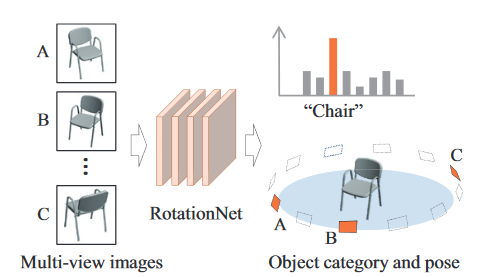RotationNet Hub
An unofficial implementation of RotationNet, using models from Tensorflow Hub.
Asako Kanezaki, Yasuyuki Matsushita and Yoshifumi Nishida. RotationNet: Joint Object Categorization and Pose Estimation Using Multiviews from Unsupervised Viewpoints. CVPR, pp.5010-5019, 2018. (pdf) (project)
Dependencies
- tensorflow >= 1.13.0
- numpy
- tqdm
Usage example
Download multiview images:
$ wget https://data.airc.aist.go.jp/kanezaki.asako/data/modelnet40v2png_ori4.tar; tar xvf modelnet40v2png_ori4.tar
From command line
Call train_rotationnet.py file.
$ python train_rotationnet.py [-h] [--module_path MODULE_PATH]
[--train_images_path TRAIN_IMAGES_PATH]
[--test_images_path TEST_IMAGES_PATH]
[--image_height IMAGE_HEIGHT]
[--image_width IMAGE_WIDTH]
[--batch_size BATCH_SIZE] [--n_views N_VIEWS]
[--warmup_epochs WARMUP_EPOCHS]
[--warmup_learning_rate WARMUP_LEARNING_RATE]
[--epochs EPOCHS] [--learning_rate LEARNING_RATE]
[--decay_steps DECAY_STEPS]
[--decay_rate DECAY_RATE] [--momentum MOMENTUM]
[--weight_decay WEIGHT_DECAY]
[--checkpoint_dir CHECKPOINT_DIR]
[--summary_dir SUMMARY_DIR]
[--max_to_keep MAX_TO_KEEP] [--v_cands V_CANDS]
optional arguments:
-h, --help show this help message and exit
--module_path MODULE_PATH
Path to tf Hub module
--train_images_path TRAIN_IMAGES_PATH
Path to training data
--test_images_path TEST_IMAGES_PATH
Path to testing data
--image_height IMAGE_HEIGHT
Image height
--image_width IMAGE_WIDTH
Image width
--batch_size BATCH_SIZE
Number of objects per batch
--n_views N_VIEWS Number of views per object
--warmup_epochs WARMUP_EPOCHS
Number of epochs training only the last dense layer of
RotationNet
--warmup_learning_rate WARMUP_LEARNING_RATE
Learning rate during warmup epochs
--epochs EPOCHS Number of total training epochs
--learning_rate LEARNING_RATE
Learning rate
--decay_steps DECAY_STEPS
Number of steps to decay the learning rate value
--decay_rate DECAY_RATE
Learning rate decaying rate
--momentum MOMENTUM Momentum
--weight_decay WEIGHT_DECAY
L2 regularization rate
--checkpoint_dir CHECKPOINT_DIR
Path for saving tensorflow checkpoints
--summary_dir SUMMARY_DIR
Path for saving summaries for tensorboard
--max_to_keep MAX_TO_KEEP
Number of checkpoints to keep
--v_cands V_CANDS Path to .npy array file with view candidatesJupyter notebook
# This config should give about 0.94 precision
# on testing set after 30 epochs
from src.model import Model
from src.trainer import Trainer
from src.dataloader import Dataloader
from src.logger import Logger
from src.utils import Config
config = {"module_path": "https://tfhub.dev/google/imagenet/mobilenet_v2_100_224/feature_vector/2",
"train_images_path": "modelnet40v2png_ori4/*/train/*",
"test_images_path": "modelnet40v2png_ori4/*/test/*",
"image_height": 224,
"image_width": 224,
"batch_size": 3,
"n_views": 20,
"warmup_epochs": 3,
"checkpoint_dir": "checkpoints/",
"summary_dir": "summary/",
"warmup_learning_rate": 0.01,
"max_to_keep": 1,
"epochs": 30,
"v_cands": "vcand_case2.npy",
"weight_decay": 1e-4,
"momentum": 0.9,
"decay_rate": 0.9,
"decay_steps": 12000,
"learning_rate": 0.00005 }
#Model config
config = Config(config)
#Session config
config_proto = tf.ConfigProto()
config_proto.gpu_options.allow_growth = True
#create session
sess = tf.InteractiveSession(config=config_proto)
#create dataloader
dataloader = Dataloader(sess, config, prefetch_buffer_size = 10)
#create the model
model = Model(sess, dataloader, config)
model.build_model()
#create a logger instance for saving summaries
logger = Logger(sess, config)
#create Trainer and train your RotationNet
trainer = Trainer(sess,model,dataloader, logger, config)
trainer.train()